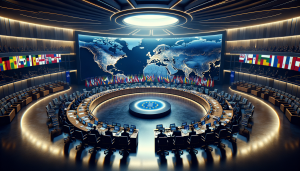Black Sea grain export deal extended, but Russia wants more on fertiliser exports

On Thursday, a deal to ease global food shortages by allowing Ukraine to export its agricultural products from Black Sea ports to the rest of the world was extended for four more months. Russia however stated that it still has its demands.
Initially reached in July, the agreement created a protected corridor for transit and was intended to relieve shortages by allowing exports from three ports in Ukraine (a major producer of oilseeds and grains).
UN Secretary General Antonio Guterres stated that he was pleased with the continuation of the Black Sea grain Initiative to facilitate safe navigation of grain, food and fertilisers exports from Ukraine.
He said that the UN was also fully committed to “removing all remaining obstacles to (Russian) exporting food, fertilisers, and other agricultural products” – an aspect of the agreement Moscow regards as crucial.
|
Russia’s foreign ministry confirmed that the agreement was extended for 120 days beginning Nov. 18, with no changes to the existing one.
Volodymyr Zelenskiy, President of Ukraine, stated that more than 450 ships have carried over 11 million tonnes worth of Ukrainian grain and other food products around the globe since August 1.
In a video address, he stated that “Tens and millions of people, primarily from Africa, have been saved form starvation… food costs are significantly lower than they would without our food exports.”
Two sources familiar with the discussions said to Reuters that the renewal has not yet included the export of Russian ammonia via a pipe to the Black Sea. One source said that Russia would continue to try to resume these exports. Fertilizers are made from ammonia.
In September Zelenskiy stated that he would only support the idea of opening ammonia exports through Ukraine if Moscow returned prisoners of war. This idea was rejected by the Kremlin.
Rebeca Grynspan (secretary-general, U.N. Conference on Trade and Development) tweeted that “The renewal of… the (deal]… is good news global food security and the developing world,” “Solving the fertiliser shortage must be done next.”
The extension of 120 days was shorter than the requested one-year by Ukraine and the United Nations. Russia stated earlier this week that the current duration of the agreement seems “justified”.
CRISIS IN GLOBAL FOOD PRICES
The global food price crisis was caused by a drop in Ukrainian shipments after Russia invaded in February. Other important drivers are the COVID-19 pandemic, and ongoing climate shocks.
The deal has shipped 11.1 million tonnes worth of agricultural products since July, including 4.5million tonnes of corn and 3.25 million tonnes wheat.
The news of the extension caused a drop in Chicago wheat prices. Corn was 1.3% and the benchmark contract was down by 2%.
One French trader stated that “this is bearish for market because it eliminates any doubts and we have something for the next four months.”
“However, it is only for 4 months… This means that in 4 months uncertainty will return, with people asking if Russia will extend its agreement.”
Russia and Ukraine are two of the world’s largest exporters of grain. Russia is the largest exporter of wheat in the world and a major supplier to global markets.
Moscow repeatedly stated that its shipments of fertilizers and grain, although not directly targeted by the sanctions, were constrained since it is difficult for exporters to receive payments or obtain vessels or insurance.
Moscow believed that Russia’s concerns about easier export conditions would be fully considered in the coming months, according to its foreign ministry.










No Comments